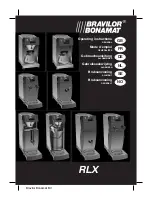
SP-6820 Revision G Reader Installation Sheet
29 June 2006
Page 2 of 2
Notes
1. When wiring the reader, connect the black wire (ground) first, and the red wire (power) last.
2. When the yellow wire is not used, the beeper remains active and under the reader’s internal control.
3. The Beeper, Hold, and LED lines are logic levels.
Never
apply power to them. They may be pulled to a low level
(0 to 1.2 VDC) to enable their function, and left floating at a high level (3.6 to 5.0 VDC) when not used.
4. SP-6820 readers have both Wiegand-protocol and RS-232 serial interfaces. For information on RS-232,
contact AWID’s technical support.
5. For additional information, please visit AWID’s web site (
www.awid.com
). Send all technical support questions
to
. Call AWID at
1-800-369-5533
from 8:00 a.m. to 7:00 p.m. Eastern Time.
6. FCC Compliance: This equipment has been tested and found to be in compliance with the limits for FCC part 15, Class A
digital device. These limits are designed to provide reasonable protection against harmful interference when the equipment
is operated in a commercial environment. This equipment generates, uses and can radiate radio frequency energy and,
if not installed and used in accordance with instruction manual, may cause harmful interference with radio
communications. Operation of this equipment in a residential area is likely to cause harmful interference in which case
the user will be required to correct the interference at his own expense.
The users are prohibited from making any change or modification to this product. Any modification to this product
shall void the user’s authority to operate under FCC Part 15 Subpart A Section 15.21 regulations.
This device complies with Part 15 of the FCC Rules. Operation is subject to the following two conditions: (1) This device
may not cause harmful interference, and (2) this device must accept any interference received, including interference
that may cause undesired operation.
7. Industry Canada Compliance: Operation is subject to the following two conditions: (1) This device may not cause harmful
interference, and (2) this device must accept any interference, including interference that may cause undesired operation
of the device.
FIGURE 1: SNAPPING OPEN THE COVER
FIGURE 2: WIRING DIAGRAM
(WIEGAND)




















